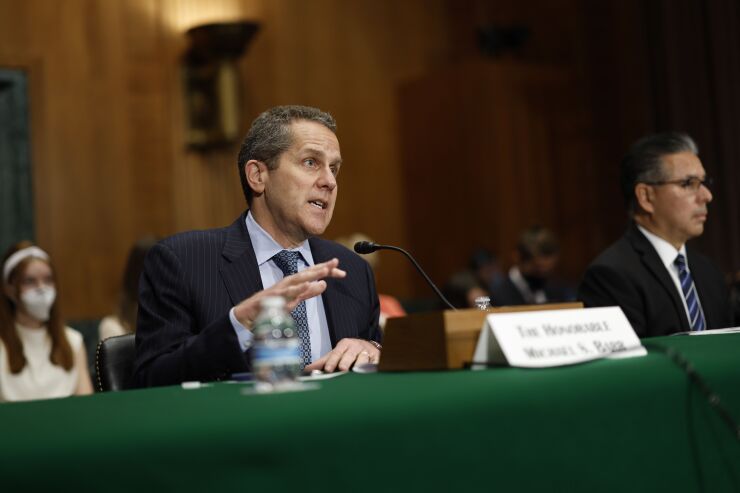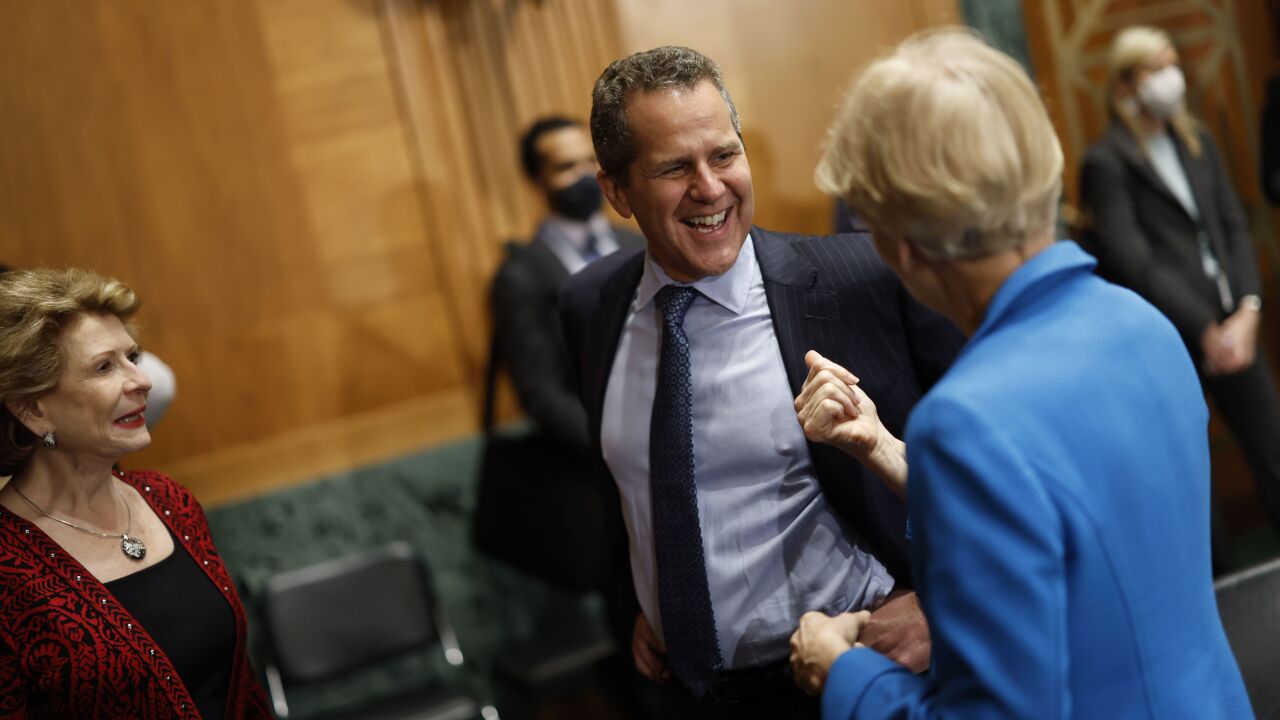Michael Barr, the Federal Reserve's newly installed vice chair for supervision, has selected a career employee from within the central bank to be his top aide.
Barr, President Biden's pick to serve as the Fed's chief regulator, tapped Christine E. Graham to be his senior advisor, sources with knowledge of the move told American Banker.
Graham is an 11-year veteran of the Fed, having most recently served as assistant director for operational resilience policy. She will be tasked with shepherding Barr's policies through the Fed's internal bureaucracy and into implementation.
The decision is a disappointment to a handful of policy advocates who had hoped Barr would bring in an outsider to fill the position. Since his

One left-leaning policy specialist described Graham's appointment as a "bad omen" for Barr's agenda as the Fed's top bank cop, signaling a commitment to a status quo that has frustrated progressives in the past.
Others applauded Barr for waving off calls for a partisan senior advisor. Unlike other governors, Barr has never worked within the Fed system, so he is wise to ingratiate himself to a staff member who knows the levers to pull to achieve certain outcomes, according to one former congressional staffer, who requested anonymity to discuss the Fed's inner workings.
"You have to work with these people day in and day out, and you have to figure out how to get the Fed bureaucracy to go where you'd like it to go," the former staffer said. "The way to fail is to try and club them."
Such grumblings demonstrate the evolving politics around the Fed broadly and the relatively new vice chair for supervision position in particular. Barr is the second person to hold the title in its current iteration.
The former Treasury official and University of Michigan administrator’s confirmation gives the Federal Reserve Board a full complement of seven governors for the first time in nearly a decade.
In the past, a governor bringing in their own staff would be unthinkable. The Fed governors must pull from the system's own ranks, and all new hires must go through the Federal Reserve Board chair. That's in contrast to other regulatory agencies, such as the Securities and Exchange Commission, in which politically appointed policymakers routinely fill out their own staffs.
Still, a handful of left-leaning advocates said Barr's predecessor, Randal Quarles, established a precedent for the vice chair for supervision to hire a senior advisor from outside the Fed. In 2019, 23 months into his tenure, he brought in Joe Carapiet, who was then the chief counsel for the Senate Banking Committee, to be his right-hand man.
Established as a presidentially nominated and Senate-confirmed position by the Dodd-Frank Act, the post of vice chair for supervision is seen by some as being the administration's standard-bearer for bank supervision and regulatory policy within the Fed. Quarles said this means having to
When he took on the job in 2017, Quarles said he faced calls from Republicans to clean house and bring in new staffers whose views on regulatory policy aligned with his. But, he noted, doing so would have been counterproductive, as it would have turned the remaining staff members against him, which is why his first senior advisor was a career staffer.
"Bringing in an outsider sends a bad signal in the first instance," Quarles said. "You need somebody who really knows the Fed, somebody that the Fed can accept as one of their own."
Quarles said Barr was shrewd to pick a senior advisor from within the Fed. He also said, in his experience, staffers executed his policy directives regardless of their personal ideologies and he expected Graham would do the same for Barr.
Also, Quarles argued Carapiet was not a true outsider. He was hired as a Fed lawyer in 2014 and sent to the Senate Finance Committee on assignment in 2015. The following year he resigned from the Fed to work directly for Senate Finance. In 2017 he made the jump over to Senate Banking, eventually working his way up to chief counsel reporting to Sen. Mike Crapo, R-Idaho. Carapiet's history with the Fed made the hire an easier sell, Quarles said.
"As we brought Joe back into the Fed to be my senior advisor, there was a lot of consideration given to the fact that we were bringing back a Fed staffer who had been sent to the Hill on detail, we were not bringing in somebody from the outside," he said. "I was a fortunate beneficiary of Joe's decision to return to the Federal Reserve and continue his prior service in the board's legal division."
Governors having their own designated advisors is a relatively new trend at the Fed, Quarles said, beginning in earnest just before he arrived. In the past, all staffers reported to the board as a whole. Quarles said he insisted on having two advisors, one for supervision issues, the other for monetary policy.
Those who have criticized Barr for not looking outside to fill his staff have raised no issue with Graham. A Vanderbilt University and University of Chicago-educated lawyer, she joined the Fed's legal division in 2011, and became assistant director for large-bank supervision in 2015 and assistant director of operational resilience in 2019.
The Fed declined to comment on the staffing move.
Yevgeny Shrago, public policy director for the consumer advocacy group Public Citizen's Climate Program, said Graham seems well qualified to execute the duties of senior advisor. He also noted that the Fed's prior reluctance to monitor climate risks more aggressively reflects board policies. Still, he said, the Fed needs a sweeping change in how it assesses climate-related financial risk and how aggressively the Fed will pursue such change on Barr's watch is an open question.
"Hopefully, Barr will empower staff to move forward," Shrago said. "But, anytime you're looking at a shift in direction or shifting culture, there's a risk that a person who has been ensconced in the culture is not going to aggressively push forward on change, even when it's needed."
The concerns about Barr's staff selection reflect the left's uneasiness with Barr as the Fed's chief regulator. Barr was the Biden administration's second pick for vice chair for supervision after progressive-favorite Sarah Bloom Raskin withdrew her nomination in the face of aggressive Republican opposition.
Barr gave few specifics about his intentions for the vice chair for supervision position during his confirmation hearing in front of the Senate Banking Committee, committing only to broad principles about the limitations of Fed power and prudential regulation. This has left many wondering what the supervision and regulatory agenda will look like in the years ahead.
While some are attempting to glean insight from his early moves in the position, others are waiting on results.
"Career Fed staff are not good or bad per se, even though the Fed has a long history of being cozy with Wall Street," said Renita Marcellin, senior banking policy analyst with the nonprofit Americans for Financial Reform. "The Fed's priority should be undoing the deregulatory damage of the Trump years and focus on new pressing issues. And in doing that, we expect the Fed governors and staff to listen to voices in the public interest, not only the industry."






